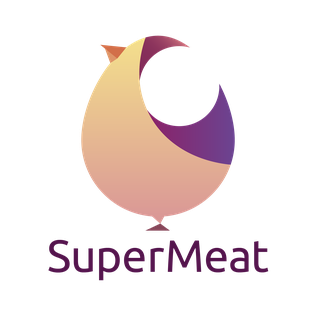Related Research Articles

Cultured meat, also known as cultivated meat among other names, is a form of cellular agriculture where meat is produced by culturing animal cells in vitro. Cultured meat is produced using tissue engineering techniques pioneered in regenerative medicine. Jason Matheny popularized the concept in the early 2000s after he co-authored a paper on cultured meat production and created New Harvest, the world's first non-profit organization dedicated to in-vitro meat research. Cultured meat has the potential to address the environmental impact of meat production, animal welfare, food security and human health, in addition to its potential mitigation of climate change.
New Harvest is a donor-funded research institute dedicated to the field of cellular agriculture, focusing on advances in scientific research efforts surrounding cultured animal products. Its research aims to resolve growing environmental and ethical concerns associated with industrial livestock production.
Eat Just, Inc. is a private company headquartered in San Francisco, California, US. It develops and markets plant-based alternatives to conventionally produced egg products, as well as cultivated meat products. Eat Just was founded in 2011 by Josh Tetrick and Josh Balk. It raised about $120 million in early venture capital and became a unicorn in 2016 by surpassing a $1 billion valuation. It has been involved in several highly publicized disputes with traditional egg industry interests. In December 2020, its cultivated chicken meat became the first cultured meat to receive regulatory approval in Singapore. Shortly thereafter, Eat Just's cultured meat was sold to diners at the Singapore restaurant 1880, making it the "world's first commercial sale of cell-cultured meat".

Upside Foods is a food technology company headquartered in Berkeley, California, aiming to grow sustainable cultured meat. The company was founded in 2015 by Uma Valeti (CEO), Nicholas Genovese (CSO), and Will Clem. Valeti was a cardiologist and a professor at the University of Minnesota.
This timeline describes major events in the history of animal welfare and animal rights.
This page is a timeline of the major events in the history of animal welfare and rights in the United States.

The Good Food Institute (GFI) is a 501(c)(3) nonprofit organization that promotes plant- and cell-based alternatives to animal products, particularly meat, dairy, and eggs. It was created in 2016 by the nonprofit organization Mercy For Animals with Bruce Friedrich as the chief executive officer. GFI has more than 150 staff across six affiliates in the United States, India, Israel, Brazil, Asia Pacific, and Europe. GFI is one of Animal Charity Evaluators' four "top charities" of 2022.

SuperMeat is an Israeli startup company working to develop a "meal-ready" chicken cultured meat product created through the use of cell culture.

Cellular agriculture focuses on the production of agricultural products from cell cultures using a combination of biotechnology, tissue engineering, molecular biology, and synthetic biology to create and design new methods of producing proteins, fats, and tissues that would otherwise come from traditional agriculture. Most of the industry is focused on animal products such as meat, milk, and eggs, produced in cell culture rather than raising and slaughtering farmed livestock which is associated with substantial global problems of detrimental environmental impacts, animal welfare, food security and human health. Cellular agriculture is a field of the biobased economy. The most well known cellular agriculture concept is cultured meat.

Marcus Johannes "Mark" Post is a Dutch pharmacologist who is Professor of Vascular Physiology at Maastricht University and Professor of Angiogenesis in Tissue Engineering at the Eindhoven University of Technology. On 5 August 2013, he was the first in the world to present a proof of concept for cultured meat. In 2020, he was listed by Prospect as the ninth-greatest thinker for the COVID-19 era.

Mosa Meat is a Dutch food technology company, headquartered in Maastricht, Netherlands, creating production methods for cultured meat. It was founded in May 2016.

Cellular Agriculture Society is a lobby organization. It is an international 501(c)(3) organization based in Miami, created in 2017 to research, fund and advance cellular agriculture.

Finless Foods, or Finless for short, is an American biotechnology company aimed at cultured fish, particularly bluefin tuna.
Aleph Farms is a cellular agriculture company active in the food technology space. It was co-founded in 2017 with the Israeli food-tech incubator "The Kitchen" of Strauss Group Ltd., and with Prof. Shulamit Levenberg of the Faculty of Biomedical Engineering at Technion – Israel Institute of Technology and is headquartered in Rehovot, Israel.

Perfect Day, Inc. is a food technology startup company based in Berkeley, California, that has developed processes of creating dairy proteins by fermentation in microbiota, specifically from fungi in bioreactors, instead of extraction from bovine milk.

BioTech Foods is a Spanish biotechnology company dedicated to the development of cultured meat from the cultivation of muscle cells previously extracted from animals.
Entomoculture is the subfield of cellular agriculture which specifically deals with the production of insect tissue in vitro. It draws on principles more generally used in tissue engineering and has scientific similarities to Baculovirus Expression Vectors or soft robotics. The field has mainly been proposed because of its potential technical advantages over mammalian cells in generating cultivated meat. The name of the field was coined by Natalie Rubio at Tufts University.

Isha Datar is the executive director of New Harvest, known for her work in cellular agriculture, the production of agricultural products from cell cultures.
Vow is an Australian company that plans to grow cultured meat for commercial distribution.

Future Meat Technologies, or Future Meat for short, is a biotechnology firm which produces cultured meat from chicken cells and is working on cultured lamb kebabs and beef burgers. Based in Israel, its main office is located in Jerusalem, while its primary production facility is operating in Rehovot. Future Meat Technologies mainly seeks to supply hardware and cell lines to manufacturers of cultured meat rather than directly selling food products to consumers. In November 2022, Future Meat Technologies rebranded to Believer Meats.
References
- ↑ "Cellular agriculture for a brighter future". The Animalist. March 22, 2016. Retrieved June 6, 2016.
- 1 2 3 4 Zuhaib Fayaz Bhat; Hina Fayaz (April 2011). "Prospectus of cultured meat—advancing meat alternatives". Journal of Food Science and Technology. 48 (2): 125–140. doi:10.1007/s13197-010-0198-7. PMC 3551074 .
- 1 2 3 "Culturing Meat for the Future: Anti-Death Versus Anti-Life" (PDF). Retrieved June 5, 2016.
- ↑ Ross, Russell (1 July 1971). "Growth of Smooth Muscle in Culture and Formation of Elastic Fibers". The Journal of Cell Biology: 172–186. doi: 10.1083/jcb.50.1.172 . Retrieved 12 February 2015.
{{cite journal}}: Cite journal requires|journal=(help) - 1 2 Markowski, Jonathon (December 31, 2013). "Moments in Meat History Part IX – In-Vitro Meat" . Retrieved June 5, 2016.
- ↑ Macintyre, Ben (2007-01-20). "Test-tube meat science's next leap". The Australian . Retrieved 2011-11-26.
- ↑ "The Year in Science: Technology". Discover. January 2006. Retrieved 2019-10-08.
- ↑ "Ingestion / Disembodied Cuisine". Cabinet Magazine. Winter 2004–2005.
- ↑ Datar, Isha (November 3, 2015). "Mark Post's Cultured Beef". New Harvest. Retrieved June 5, 2016.
- ↑ "Paper Says Edible Meat Can be Grown in a Lab on Industrial Scale" (Press release). University of Maryland. 2005-07-06. Retrieved 2008-10-12.
- ↑ Siegelbaum, D.J. (2008-04-23). "In Search of a Test-Tube Hamburger". Time . Archived from the original on January 22, 2010. Retrieved 2009-04-30.
- 1 2 Harvey, Chelsea (September 26, 2014). "This Brooklyn Startup Wowed The Science Community With Lab-Made 'Meat Chips'". Business Insider. Retrieved June 5, 2016.
- ↑ Fountain, Henry (August 5, 2013). "A Lab-Grown Burger Gets a Taste Test". The New York Times. Retrieved April 24, 2016.
- ↑ Datar, Isha (November 5, 2015). "Muufri: Milk without Cows". New Harvest. Archived from the original on June 9, 2016. Retrieved June 5, 2016.
- ↑ Datar, Isha (November 4, 2015). "Clara Foods: Egg Whites without Hens". New Harvest. Retrieved June 5, 2016.
- ↑ Wohlsen, Marcus (April 15, 2015). "Cow Milk Without the Cow is Coming to Change Food Forever". Wired. Retrieved June 7, 2016.
- ↑ United Poultry Concerns. "Chickens" . Retrieved May 19, 2016.
- ↑ Leichman, Abigail Klein (November 19, 2015). "Coming soon: chicken meat without slaughter". Israel21c. Retrieved May 18, 2016.
- ↑ Crew, Bec (April 2, 2015). "Cost of lab-grown burger patty drops from $325,000 to $11.36". Science Alert. Retrieved June 7, 2016.
- ↑ Burwood-Taylor, Louisa (March 17, 2016). "New Crop Capital Closes $25m Fund, Invests in Beyond Meat". AgFunderNews. Retrieved June 6, 2016.
- ↑ Zacharias, Nil (March 16, 2016). "The Race to Disrupt Animal Agriculture Just Got a $25 Million Shot in the Arm, and a New Non-Profit" . Retrieved June 6, 2016.
- ↑ Hanson, Hilary (February 2, 2016). "'World's First' Lab-Grown Meatball Looks Pretty Damn Tasty". The Huffington Post. Retrieved April 24, 2016.
- ↑ "First-ever cellular agriculture conference". May 31, 2016. Archived from the original on August 18, 2016. Retrieved June 6, 2016.
- ↑ Clean Meat. ISBN 978-1-5011-8908-1 . Retrieved 22 October 2020.
- ↑ "Washington bestsellers: Hardcover nonfiction". Washington Post. Retrieved 22 October 2020.
- ↑ Kowitt, Beth (July 11, 2019). "The First 'Animal-Free' Ice Cream Hits the Market". Fortune. Retrieved 2020-09-26.
- ↑ "Memphis Meats' investment more than doubles global investment". The Good Food Institute. 2020-01-22. Retrieved 2020-02-23.
- ↑ Wolf, Michael (2021-10-13). "USDA Awards $10 Million to Tufts University to Establish a Cultivated Protein Center of Excellence". The Spoon. Retrieved 2021-10-14.